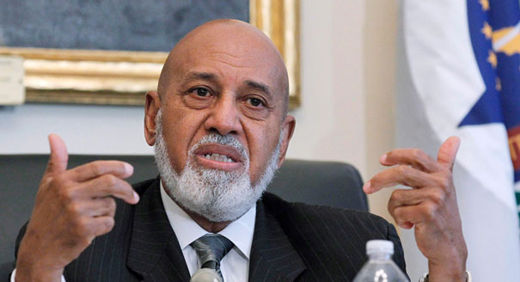
ORLANDO, Fla. – U.S. Rep. Alcee Hastings, D-Fla., wants Floridians to vote in November 2016 on a constitutional amendment to raise the state’s minimum wage to $12.50 an hour initially-which would be the highest among the states-with increases in it tied to the inflation rate.
The campaign to gather 683,000 signatures to place the measure on the ballot will begin “no later” than April, Hastings told the South Florida Sun-Sentinel on Feb. 15. It would need 60 percent of the vote to pass.
Hastings, the newspaper reports, “has already started testing the waters, outlining his plan earlier this month at a Democratic gathering in Coral Springs and referencing ‘my work to raise the minimum wage'” in a recent fund-raising e-mail.
“I believe if you can get momentum going, it will take on a life of its own,” said Hastings, whose heavily-Democratic district encompasses Fort Lauderdale and West Palm Beach.
The $12.50 an hour is just a “starting point,” said Hastings, adding that he isn’t seeking $15 an hour because that would make the opposition “go bonkers.”
Florida’s minimum wage increased to $8.05 an hour ($5.03 for tipped workers) on Jan.1-a whopping 12 cents more than the previous year. Over half the states in the U.S. have minimum wages that are higher than the federal rate of $7.25 an hour (last raised in 2009).
Hastings also has supported raising the federal wage to $10.10 an hour, an idea proposed by President Obama and supported mostly by Democrats.
“A full-time minimum wage worker earns only $15,080 a year, making it nearly impossible to support a family and save for the future,” Hastings noted in a statement released last October on National Minimum Wage Day. “Raising the national minimum wage to $10.10 would return it to close to its 1960s inflation-adjusted value and permit millions of additional workers to independently support their families.”
As wages and benefits have stagnated, raising pay through the ballot box has gained favor with voters. Four Republican-leaning states-Alaska, Arkansas, Nebraska and South Dakota-approved measures last November that brought their minimum wages up to $8.50 to $9.75 an hour, depending on the state.
A Quinnipiac University poll of Florida voters in January, 2014 found that 73 percent were in favor of raising the minimum wage although they were not asked to specify the amount of the increase. Support came from all political sectors, ranging from more than 90 percent among Democrats and 74 percent among independent and third-party voters, to 53 percent among Republicans.
Hastings’ proposal would replace the minimum wage amendment to Florida’s constitution that voters approved in 2004. That measure created a minimum wage of $6.15 an hour ($1 higher than the federal rate in effect at that time), indexed to the federal Consumer Price Index.
It was backed by a coalition of labor unions and progressive groups, including the Service Employees International Union, the American Federation of State, County and Municipal Employees, the National Education Association and Moveon.org. Seventy-one percent of voters supported the 2004 measure although big business interests-including Publix Supermarkets, Outback, the Florida Restaurant Association, the Florida Chamber of Commerce, Burger King and Walt Disney-spent more than $4 million trying to defeat it.
While this was a setback for big business, they have, in recent years, been able to stymie other measures to improve wages, benefits and worker protections. These have included stopping enactment of a statewide wage-theft law and passing a law, in 2013, that bars Florida’s counties and municipalities from mandating earned or paid sick time.
However, the factors that drove enthusiasm for the 2004 amendment have not abated. These include low wages, the lack of benefits, such as sick time, and the refusal of Florida’s GOP-controlled legislature to expand Medicaid to aid more than a million Floridians who earn too little to qualify for health insurance subsidies under the Affordable Care Act.
Florida’s current minimum wage would have to be more than doubled to $16.98 an hour to be a “living wage” for a single person working full-time, according to a 2014 report by the Washington-based Alliance For a Just Society. For a household with two working adults and two children, Florida’s minimum wage would need to be at least $20.18 to cover food, housing, utilities, transportation, child care and other necessities.
“Too many working families in Florida depend on poverty-level wages without access to sick leave, requiring cutting back on essentials, choosing whether to work while sick or lose earnings and possibly their job, and living with sky-high medical debt,” noted the Alliance. “Working families need more support, including increased wages, to help ensure that full-time work ensures the ability to make ends meet.”
Photo: Rep. Alcee Hastings, D-Fla. (AP Photo/Manuel Balce Ceneta, File)












Comments